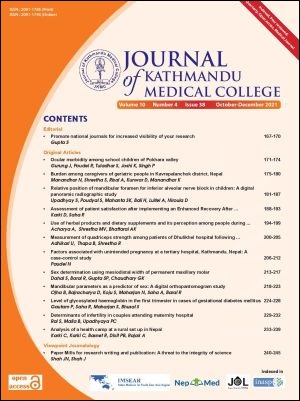Analysis of a health camp at a rural set up in Nepal
DOI:
https://doi.org/10.3126/jkmc.v10i4.43864Keywords:
Health Camp, Rural, NepalAbstract
Background: In Nepal where there is lack of health facilities in rural areas, health camps play an important role in providing health services. It is important to analyse health camps to determine the area of need and further planning. An analysis of a multispecialty health camp was done in Aurahi of Mahottari district which is one of the most rural areas of Nepal.
Objectives: To quantitatively determine the population utilising the multispecialty health along with the patients’ demographic data and major health problems present in the area.
Methods: A descriptive cross sectional study was conducted among 2560 people attending a health camp organised during 19th to 25th December 2019. Information was collected using registers with consent. Ethical clearance for the study was obtained from the Institutional Review Committee (IRC). The data were entered and analysed in Microsoft Excel.
Results: Two thousand five hundred and sixty people which comprised 8.06% of the total population of the municipality reached out for services at the health camp. The number and percentage of population attending respective speciality were Nutrition - 869 (33.93%), Dental - 429 (16.75%), Gynaecology - 398 (15.50%), Medicine - 268 (10.46%), Obstetrics - 218 (8.52%), non-specific symptoms - 152 (5.94%), Dermatology - 122 (4.77%), ENT - 82 (3.22%) and Surgery - 50 (1.97%) respectively.
Conclusion: The study shows presence of significant unmet health needs in this rural district of Nepal due to the lack of basic health services in the region.
Downloads
Downloads
Published
How to Cite
Issue
Section
License
Copyright © Journal of Kathmandu Medical College
The ideas and opinions expressed by authors or articles summarized, quoted, or published in full text in this journal represent only the opinions of the authors and do not necessarily reflect the official policy of Journal of Kathmandu Medical College or the institute with which the author(s) is/are affiliated, unless so specified.
Authors convey all copyright ownership, including any and all rights incidental thereto, exclusively to JKMC, in the event that such work is published by JKMC. JKMC shall own the work, including 1) copyright; 2) the right to grant permission to republish the article in whole or in part, with or without fee; 3) the right to produce preprints or reprints and translate into languages other than English for sale or free distribution; and 4) the right to republish the work in a collection of articles in any other mechanical or electronic format.




